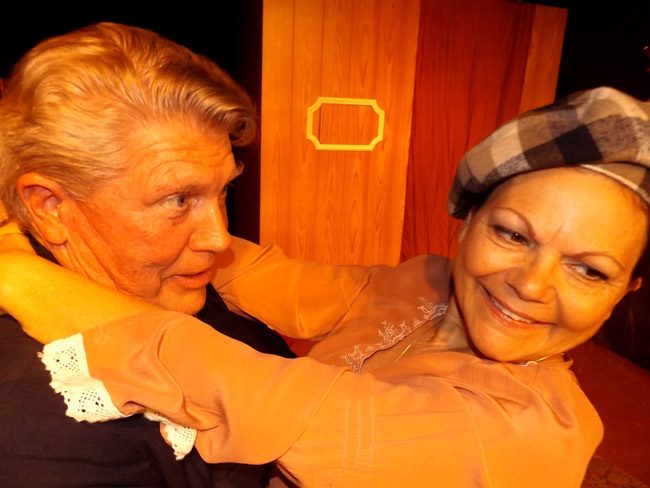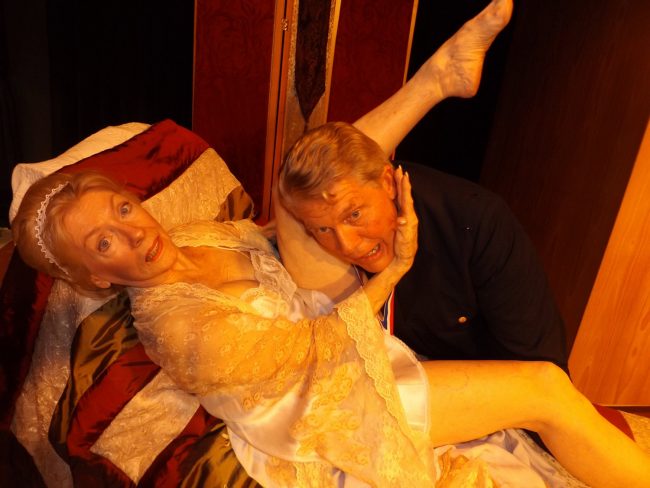
Book your tickets for “Waltz of the Toreadors” easily online here.
![]()
Actor John Pope may be casting a nervous eye on the women in the audience when he takes the stage in City Repertory Theatre’s production of “The Waltz of the Toreadors” this weekend.
“I’m a little worried because John says that probably about a half-hour into the show, they’re going to start throwing tomatoes at me – the women will,” Pope said with a hearty chuckle, referring to John Sbordone, the theater’s director. “And the men will be going ‘No, no no!’ ”
The 1951 farce by French playwright Jean Anouilh, which opens Friday (March 24), tells the story of General Léon Saint-Pé (played by Pope). The general is not a pleasant fellow. He’s a lecher. He’s pompous. He thinks his insufferable memoirs of his years in the military, which he’s dictating, will have appeal. He’s also despondent at the thought of retirement with his hypochondriac wife, Madame Saint-Pé (Anne Kraft). The abuse she heaps on him doesn’t seem undeserved. And so the general sets out to rekindle an unconsummated flirtation with Ghislaine (Evelyn Lynam), a woman he danced with 17 years ago. They had danced “The Waltz of the Toreadors” together. But he must compete for her with a much younger suitor.
“The general is not overt,” Pope said, sounding as if he were trying to assuage any potential tomato throwers. “He’s in this house in the country, obviously retired. And there are young maids around that he flirts with. He sees himself as a young stud still. And all that’s just fun and games that mean nothing to him.
“But the one love of his life, who he met 17 years ago — nothing has ever really happened with that. Now she has come to his home saying that she has proof that his wife has been untrue to him and that they can now be together. They don’t have to put up with her nonsense.”
“My character is the chronic invalid who uses her illness to hold on to her husband,” said Kraft, who worked as a professional actress in New York for 25 years. “She stays not for romantic reasons but for economic and legal reasons. She’s one who would not give up her status, her name. But the general has not been true to her. He’s a skirt chaser. Well, this is what she believes.”

American or English audiences may hear that “F” word – farce – and think of such silly hide-your-mistress-in-the-bedroom-closet affairs as Joe Orton’s “What the Butler Saw” or Ray Cooney’s “Run For Your Wife.” But Anouilh is after bigger game.
“It’s absolutely a funny play, but it goes a little deeper than that,” said Sbordone, who also plays the role of Father Ambrose. “It was written at the time when Sartre and Camus were very much reliving how the world was made, and Anouilh was a part of that. There are philosophical elements to the play in which the characters question who they are and what their moral responsibilities are — things that you normally wouldn’t see in a farce.
“The physicality of the play is so very important. The language of the play never talks down to the audience. The stereotypes are filled out so they’re not stereotypes.”
Besides, “farce” means something different on the two sides of the Atlantic: on the American stage it is often an end in itself–the gag for gag’s sake. In Anouilh’s hands, it’s more of a means to an end, and usually a more searching end: he’s a pessimist at heart. Life doesn’t seem to him the greatest idea ever devised (and why should it to survivors of World War II?) Which is probably why it took Anouilh’s’s plays a while to win acceptance even in unscathed New York: five of his plays between 1946 and 1954, when Anouilh was at the height of his powers and popularity in France, failed on Broadway, none getting more than 70 performances. Then came “Thieves’ Carnival” and “The Lark,” and he was finally a hit.
You don’t have to trouble yourself with the subtext of an Anouilh play to enjoy is ribaldry. But it makes it more fun, considering Anouilh’s targets: the pretenses of middle class life, family, honor and the rest of it. After all, The name Saint-Pé is a pun on the French word for “fart,” albeit a presumably haloed fart.
“I’m hoping the audience will have fun with the General character,” said Pope, a City Rep veteran whose past credits include “Wrong Turn at Lungfish” and “The Last Romance.”
But Pope noted his character has a pensive side: “He admits nothing that he ever really wanted has come to fruition. He married an opera singer and took her away from the stage, and he’s sort of regretful of that. There’s a line that she ‘continued acting for me alone — a performance over 20 years tends to get boring.’ ”
Anouilh, who died in 1987 at age 77, grouped his plays according to their tone: Pièces noires (“black plays”) were tragedies or realistic dramas such as his renowned “Antigone,” which was inspired by Sophocles’ work and was staged in 1944 Paris during the Nazi occupation. (The production “aroused much controversy with its study of personal loyalties in conflict with authority,” says “The Concise Oxford Companion to the Theatre.”)
Other Anouilh groupings included pièces roses or “pink plays” (fantasy-laden comedies) and pièces brillantes or “brilliant” or “glittering plays” (tales of middle-age reflection).
As for “Toreadors”? Anouilh placed it among his pièces grinçantes – “grating plays.” You laugh, but you also feel uncomfortable. The wit is sugarcoating for a melancholy bitterness that grates the stage and doesn’t spare one’s conscience. But that sugarcoating is no saccharin: Anouilh could turn a phrase.
The character of the general “is so well written that probably Donald Duck could play the part,” said Pope, who previously performed the role some 20 years ago. “The lines are so beautifully put together that I hope I do it justice.”
Yet those beautiful lines are put into the service of a charlatan and his “shrew” (Pope’s term) of a manipulative wife.
For new audiences, an Anouilh play can go either way. Palm Coast’s audiences haven’t had the luck of warming up with “Legend of Lovers” and “Mademoiselle Colombe” (among the plays that failed in Broadway’s 1950s). Are audiences going to find either of these “grating” characters sympathetic?
“I think that comes from the viewers’ perspective and their own experience in life and what their take on this behavior is,” said Kraft, whose City Rep credits include “The Search for Signs of Intelligent Life in the Universe” and a one-woman show of Joan Didion’s “The Year of Magical Thinking.”
“Some will sympathize with it,” Kraft added. “Some will say it’s dreadful – how could they do that? When in fact people do that all the time. In approaching a role, I never try to make the character sympathetic. I try to make audiences understand why she behaves the way she does. Then the audience can decide whether they sympathize with her or not. Some may, some may not depending on their life experience. If I can make them understand why she does this, I feel I’ve succeeded.”
The cast also includes Beau Wade as Gaston, Earl Levine as the Doctor, Victoria Page as Mme. Dupont-Fredaine, Lily Beltz as Estelle, Genevieve Shubeck as Sidonia, Debra Laudat as Eugenie and Phillipa Rose as Pamela.
![]()
“The Waltz of the Toreadors,” directed by John Sbordone, written by Jean Anouilh, at City Repertory Theatre, 7:30 p.m. Fridays and Saturdays and 2 p.m. Sundays from March 24-April 2 in City Marketplace, 160 Cypress Point Parkway, Suite 207B, Palm Coast. Tickets are $20 adults and $15 students with ID, available at the door, by calling 386-585-9415 or online here.





























Leave a Reply